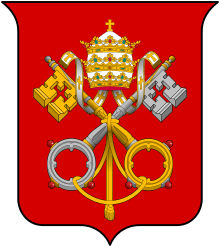Pope Lucius III
| Pope Lucius III | |
|---|---|
 | |
| Papacy began | 1 September 1181 |
| Papacy ended | 25 November 1185 |
| Predecessor | Alexander III |
| Successor | Urban III |
| Orders | |
| Consecration | 1159 |
| Created Cardinal |
December 1138 by Innocent II |
| Personal details | |
| Birth name | Ubaldo Allucingoli |
| Born |
ca. 1100 Lucca, Holy Roman Empire |
| Died |
25 November 1185 Verona, Holy Roman Empire |
| Previous post |
|
| Other popes named Lucius | |
Pope Lucius III (ca. 1100 – 25 November 1185), born Ubaldo Allucingoli, reigned from 1 September 1181 to his death in 1185.[1]
Biography
A native of the independent republic of Lucca, he was born ca. 1100 (perhaps 1097) as Ubaldo, son of Orlando. He is commonly referred to as a member of the aristocratic family of Allucingoli, but this is not proven.[2] He had close ties to the Cistercians, but it seems that he never joined the order.[3] He was named cardinal by Pope Innocent II in December 1138, initially as cardinal-deacon of San Adriano, then (in May 1141) as cardinal-priest of Santa Prassede. Pope Adrian IV promoted him to the rank of Cardinal Bishop of Ostia and Velletri in December 1158. He was dean of the Sacred College of Cardinals and one of the most influential cardinals under his predecessor Pope Alexander III.
Election and papacy
After being elected Pope in 1181, he lived at Rome from November 1181 to March 1182, but dissensions in the city compelled him to pass the remainder of his pontificate in exile, mainly at Velletri, Anagni and Verona.
He disputed with the Holy Roman Emperor Frederick I over the disposal of the territories of the late Countess Matilda of Tuscany. The controversy over the succession to the inheritance of the Countess had been left unsettled by an agreement of 1177, and the Emperor proposed in 1182 that the Curia should renounce its claim, receiving in exchange two-tenths of the imperial income from Italy, one-tenth for the Pope and the other tenth for the cardinals. Lucius consented neither to this proposition nor to another compromise suggested by Frederick I the next year, nor did a personal discussion between the two potentates at Verona in October 1184 lead to any definite result.
During the conflict between Frederick I and the papacy, the problem of heresy required a political solution. In 1184, Pope Lucius III decreed Ad abolendam that all "counts, barons, rectors, [and] consuls of cities and other places" who did not join in the struggle against heresy when called upon to do so would be excommunicated and their territories placed under interdict – and declared that these provisions joined the apostolic authority of the church with the sanction of imperial power.[4]
In the meantime other causes of disagreement appeared when the Pope refused to comply with Frederick I's wishes as to the regulation of German episcopal elections which had taken place during the schism, especially as regards an election to the See of Trier in 1183 contested between the papal candidate Folmar of Karden and the imperial candidate Rudolf of Wied.
In pursuance of his anti-imperial policy, Lucius declined in 1185 to crown Henry of Hohenstaufen as Frederick I's destined successor, and the breach between the Empire and the Curia became wider on questions of Italian politics.
In November 1184 Lucius held a synod at Verona which condemned the Cathars, Paterines, Waldensians and Arnoldists, and anathematized all those declared as heretics and their abettors. Contrary to what is often said, he did not institute the Inquisition, which was not created until the reign of Pope Gregory IX in 1234.
Death
In 1185 preparations began for the Third Crusade in answer to the appeals of King Baldwin IV of Jerusalem. Before they were completed, Lucius III died in Verona.
Notes
- ↑
 Herbermann, Charles, ed. (1913). "Pope Lucius III". Catholic Encyclopedia. New York: Robert Appleton Company.
Herbermann, Charles, ed. (1913). "Pope Lucius III". Catholic Encyclopedia. New York: Robert Appleton Company. - ↑ J. M. Brixius, Die Mitglieder des Kardinalkollegiums voin 1130–1181, Berlin 1912, p. 90
- ↑ S. Miranda: Cardinal Ubaldo Allucingoli (note 1); I. S. Robinson, The Papacy 1073–1198. Continuity and innovation, Cambridge University Press 1990, p. 212.
- ↑ Bornstein, Daniel Ethan, Medieval Christianity , 2009 (Minneapolis: Fortress Press ), 237
References
- Philippe Levillain, John W. O'Malley, The Papacy. An Encyclopedia, 2002
 This article incorporates text from a publication now in the public domain: Chisholm, Hugh, ed. (1911). "Lucius". Encyclopædia Britannica (11th ed.). Cambridge University Press.
This article incorporates text from a publication now in the public domain: Chisholm, Hugh, ed. (1911). "Lucius". Encyclopædia Britannica (11th ed.). Cambridge University Press. This article incorporates text from a publication now in the public domain: Jackson, Samuel Macauley, ed. (1914). "article name needed". New Schaff–Herzog Encyclopedia of Religious Knowledge (third ed.). London and New York: Funk and Wagnalls.
This article incorporates text from a publication now in the public domain: Jackson, Samuel Macauley, ed. (1914). "article name needed". New Schaff–Herzog Encyclopedia of Religious Knowledge (third ed.). London and New York: Funk and Wagnalls.
| Catholic Church titles | ||
|---|---|---|
| Preceded by Ugone |
Bishop of Ostia 1158–81 |
Succeeded by Thibaud of Ostia |
| Preceded by Alexander III |
Pope 1181–85 |
Succeeded by Urban III |

